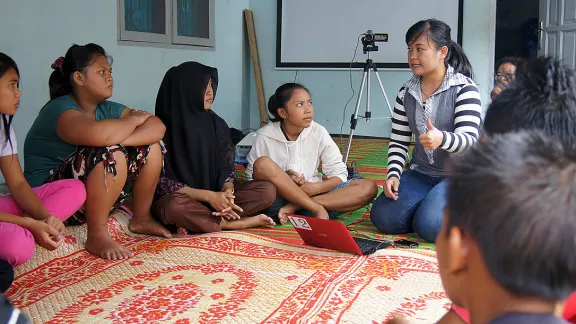
Elisabeth Purba (center) talking about HIV and AIDS at a youth workshop organized by the Indonesia LWF National Committee in Desa Bulu Cina, Sumatra. New global development goals will work to lower HIV and AIDS transmission rates. Photo: LWF/C. Kästner
Junge reflects on LWF’s participation in New York roundtable
(LWI) - The Lutheran World Federation (LWF) welcomes the increased awareness in the United Nations (UN) of the contribution of faith-based organizations to global development.
LWF General Secretary Rev. Dr Martin Junge said this was particularly evident during the 10-11 July roundtable discussion hosted by UN agencies in New York to discuss collaboration and potential partnerships in the areas of governance, peace and security and gender equality. He was among 50 leaders of faith-based organizations taking part in the meeting that also focused on future objectives for Sustainable Development Goals (SDGs) to be agreed at the next UN Summit this September.
The post-2015 sustainable development goals are a set of 17 targets to end poverty in all its forms everywhere. They include halting hunger, gaining food security and improved nutrition; ensuring healthy lives and wellbeing for all ages, as well as equitable quality education for all; and achieving gender equality and empowerment for all women and girls. They also focus on ensuring availability and sustainability of water and sanitation; access to reliable and modern energy; urgent action to combat climate change and its impacts; and sustained, inclusive and sustainable economic growth with full and productive employment.
“There is recognition for the role of faith-based organizations, not only in view of their implementing capacity but also in view of their specific vocation to promote justice, peace and reconciliation,” Junge noted.
“This vocation is a powerful resource that churches can offer within their own contexts. It triggers and boosts commitment to work for life in fullness for all,” he said.
The general secretary said more work needs to be done to “promote literacy at both ends” so that faith-based organizations and the UN can better relate to one another, particularly as they both work to promote dignity and fullness of life for all.
“I see much potential for the LWF and its member churches to contribute towards the attainment of the sustainable development goals,” he added.
At its Council meeting in June, the LWF affirmed its support for the SDGs which include good governance (transparency, accountability, anti-corruption), justice for the poor, equality (equal access to essential services) and peacebuilding.
The governing body urged LWF member churches to stay informed about the SDGs and advocate for their full funding and implementation.
At the New York roundtable, faith groups joined officials from the UN Development Programme, UN Children’s Fund and UNAIDS among others, to negotiate the post-2015 universal development goals. In a similar gathering in 2014, the UN highlighted the need to promote partnerships with faith-based organizations.
The UN adopted the Millennium Declaration in 2000, targeting eight objectives—Millennium Development Goals—to halve global poverty by 2015. They are considered one of the most successful anti-poverty initiatives in history, with most of the targets met by 2010. This includes access to primary education by children in developing regions, prevention of malaria deaths and availability of life-saving HIV medication.
“It is for centuries that churches and their institutions have been involved in development work within their own contexts,” Junge said.


